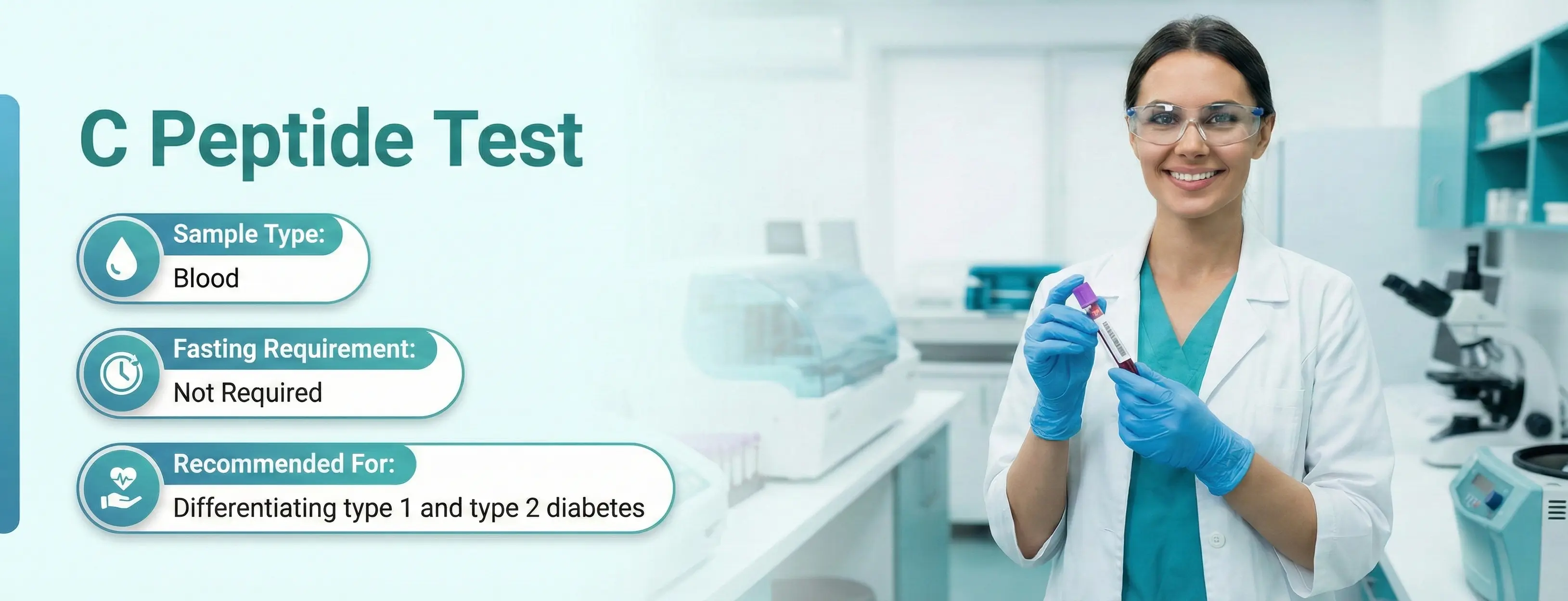179+ orders placed in your location
100% NABL & ISO Certified Lab • 100% Accurate Reports
C Peptide Test
Insulin C-peptide test, Connecting peptide Insulin, Proinsulin C- Peptide
- SummaryThe C-Peptide test measures the level of C-peptide in the blood, which reflects how much insulin your body is producing. It helps differentiate between type 1 and type 2 diabetes, assess insulin resistance, and evaluate pancreatic function. The test is done using a blood sample, and fasting for 8–10 hours is usually recommended for accurate results.Read more
- Reports Within16 HrsView Sample Report100% NABL & ISO Certified Labs
- SampleBlood
- AgeAll Age Group
- GenderMale and Female
- Fasting10-12 Hrs
PharmEasy Promises
Know More About The Test
A quick info on C Peptide Test
Overview
The pancreas secretes a hormone called insulin. It controls the level of glucose(sugar) in your blood at any given time. It also helps store glucose in your liver, muscles and fats. If your body is not producing enough insulin, it is a sign of Type 1 or Type 2 Diabetes.
The C-peptide test measures C peptides in blood. C peptide is also secreted with insulin in the pancreas. Insulin and C peptide are secreted at the same time and in almost equal quantities in the pancreas. Thus, this test helps in showing how much insulin your body is releasing.
C-peptide has a half-life of 30 minutes and tends to stay in the body longer than insulin. Insulin has a half-life of 15 mins. Therefore, this test is an excellent way to measure insulin levels, especially insulin levels produced by the pancreas and exclude the insulin level in the bloodstream from injected insulin.
A C-peptide test helps with the diagnosis of Type 1 and Type 2 Diabetes Mellitus. The difference between the two is, in Type 1 Diabetes, the pancreas secretes a negligible amount of insulin and negligible C-peptide. Whereas in Type 2 Diabetes, the pancreas secretes insulin, but the body does not use it properly, which causes C-peptide levels to be higher than usual. If the result of the C-peptide test confirms Diabetes diagnosis, treatment should be initiated under expert guidance.
You may require a C-peptide test if your glucose levels are low(hypoglycemia) and show symptoms like irregular heartbeat, uncontrolled hunger, blurred vision, dizziness and excessive sweat.
Also, the test is recommended to diagnose a tumour in the pancreas. Extremely high levels of C-peptide would be suggestive of a tumour. The tumour is known as insulinoma. The C-Peptide test is used to diagnose if your pancreas is to be removed during surgery.
Diabetes Mellitus is common in India due to various possible factors, such as genetic factors associated with lifestyle changes leading to conditions such as obesity. In India, however, Diabetes prevalence is higher even among those with lower weight, suggesting that relatively lean Indian adults with a lower body mass index may also be at risk. As a result, Diabetes is rapidly on its way to becoming a potential epidemic in India. At the moment, there are an alarming 62 million diabetic individuals currently diagnosed with the disease in India.
Risk Assessment
Hypoglycemia, Type 1 and Type 2 Diabetes Mellitus, Insulinoma
What does this test detect?
The C-peptide test measures the levels of C- peptide in the blood, which helps us to know the status of endogenous insulin in the body.
Some disease conditions for which a C-peptide test can be prescribed are:
- Type I Diabetes Mellitus
- Type II Diabetes Mellitus
- Insulinoma
Indications for C Peptide Test
Generally, a C-peptide Test is ordered if your symptoms indicate Diabetes Mellitus. Some indications of prescribing C-peptide Test are:
- Your blood glucose levels are higher than average.
- Greater than 120 mg/dL while fasting or alternatively they are
- Greater than 200 mg/dL during a random blood test
- Irregular Heartbeat
- Uncontrolled hunger.
- Blurred vision
- Sweating
- Confused state of mind
- Dizziness and Fainting
- Unexplained weight loss
- Frequent Urination
- Feel lethargic
- Thirsty
- Tingling sensations in extremities
How frequently should you take this test?
The C-peptide test may be repeated by the consulting physician to check and evaluate the effectiveness of the Diabetes treatment. Doctors may prescribe a C-peptide test every six months, following a diagnosis of Diabetes Mellitus by an M.D. physician or endocrinologist, to monitor and regulate the dosage. The results of the C-peptide test may help your doctor continue the same treatment or modify the dosage of ongoing medicines.
Test Preparation
Before the Test
Before the C Peptide Test, your doctor may not provide specific dietary or preparatory instructions. However, if another test is on the agenda that necessitates special preparation, your doctor might suggest a fasting period. It is crucial to consult with your doctor before undergoing any tests.
During the Test
When theC Peptide Test takes place, a qualified phlebotomist will collect a blood sample from your arm. The procedure includes these steps:
- Sterilising the likely area for needle insertion with antiseptic solutions.
- Applying a tourniquet to your arm to enhance the vein visibility.
- Inserting a needle into the selected vein to draw blood, which may cause a brief pinching sensation for a few seconds.
- Transferring the collected blood into a vial or small tube, followed by labeling it with your personal information.
After the Test
Right after the blood collection you can expect the following:
- A bandage will be placed over the needle insertion site to minimize any bleeding.
- Bruising at the insertion site is common. If you feel lightheaded, it is recommended to rest for a short period.
- If you experience ongoing bleeding, discomfort, or unusual skin reactions at the insertion site, it is essential to reach out to your doctor for further assistance.
Parameters
C-peptide levels are the only parameters included in this test. They provide information on the secretion of insulin by the pancreas. The C-peptide test does not give a positive or negative result. It gives the range or value of C-peptide secreted by the pancreas in the blood.
Ranges
|
C-Peptide Level (ng/mL) |
Result Category |
|---|---|
|
0.5 to 2.0 ng/mL |
Normal range |
|
Less than 0.5 ng/mL |
Low - Type 1 Diabetes |
|
More than 2.0 ng/mL |
High - Type 2 Diabetes |
These levels are high when the pancreas secretes high insulin and are low when the insulin secretion is minimal.
The normal values and reference ranges of the test may vary from lab to lab. Please refer to the ranges mentioned in the report and consult a doctor to understand the interpretation of lab reports.
Test Result Interpretation
High levels of C-peptide indicate:
- A high insulin level means the body has developed resistance to insulin which interprets that your body is not utilising the insulin secreted by the pancreas. (Also, if you have Type 2 Diabetes, your insulin levels may be high.)
- This may also indicate a tumour known as insulinoma, in which the tumour secretes excess insulin.
Low levels of C-peptide indicate:
- You have Type 1 or Type 2 Diabetes, with the pancreas releasing little or no insulin in your body.
- You are taking insulin as your treatment for Diabetes Mellitus and the insulin taken is suppressing the release of endogenous insulin.
- Treatment for insulinoma has worked and the tumour has shrunk.
Risks and Limitations
The C-Peptide test, a frequently conducted blood and urine test, has minimal risks of complications. Seek advice from your doctor if you notice:
- Continuous bleeding from the site where the blood was drawn
- Inflammation, swelling, or discomfort at the site
Limitations of the test
- Errors due to faulty equipment or mistakes made by the phlebotomist
- The possibility of misreading certain indicators, resulting in an incorrect diagnosis and report.
Was This Test Information Helpful?
Please rate your experience
References
People Also Ask
What C-peptide level indicates diabetes?
What does it mean if your C-peptide is high?
What does a positive C-peptide mean?
How long does it take to get C-peptide results?
How can we reduce C-peptide?
Popular Tests
Have any doubts? Ask us.
Ask us anything about the C Peptide Test to understand it better
We provide trusted, expert-curated health content to support better awareness,prevention, and care.
Backed by experienced doctors, medical experts, and strict editorial standards.


